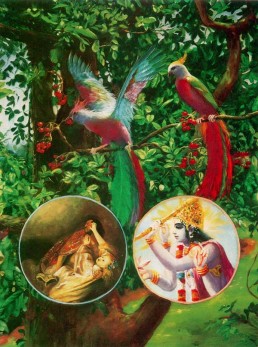
विभूतियोग
Vibhūti-Yoga - The Divine Glories
Arjuna acknowledges the Supreme nature of the Lord but asks how He can constantly be remembered even as one is perceiving this pluralistic world. In response, the Lord provides a long list of His glorious manifestations in the perceived universe. Lest anyone misunderstand that the Lord is limited to these forms, he concludes by saying that there is, in fact, no end to His glories. Below are the main themes of Chapter 10:
Verses 1 - 3
Introduction and the glory of this knowledge
Verses 4 - 7
Lord’s glory in brief and the benefit of that knowledge
Verses 8 - 11
Virāṭ-devotees and the benefit of such a devotion
Verses 12 - 18
Arjuna’s request for elaboration
Verses 19 - 42
Lord’s glories elaborated
Gita Chapter 10 - 42 Verses
Chapter 10 - 42 Verses
Commentary by Swami Paramarthananda
Background
[In the previous three chapters, Lord Kṛṣṇa revealed God as the ma-terial cause of the universe. Since the effect cannot be different from the material cause, it clearly follows that the universe cannot be differ-ent from God. Thus the entire universe is the divine manifestation of God. Hence whatever glories we see in the creation belong to the Lord alone. Kṛṣṇa reveals this idea in this chapter as the culmination of his teaching of Virāṭ (Viśvarūpam).]
In the first three verses, Kṛṣṇa introduces the topic of vibhūti and yoga — vibhūti is the manifestation of Lord and yoga is the power of manifestation. Even great sages cannot talk about the glories of the Lord, because they are finite beings born later. Hence it is the rarest knowledge that is given. One who gains this knowledge will be free from saṃsāra (1 to 3).
In the next four verses, the Lord reveals His glory by pointing out that the entire subtle universe of thoughts as well as the gross universe are born of Him. The seven great sages, the four sages Sanaka etc., and the Manus are all born of the mind of the Lord. One who knows this attains self-knowledge ultimately (4 to 7).
The following four verses deal with the Virāṭ-devotees and the benefits of such a devotion. The devotees accept everything as a gift of God, because God is the source of all. They think about God, speak about God, hear about God — in short they spend their lives revelling in God all the time (8, 9). (Still they are saguṇa-devotees only. They are ignorant of the highest nature of the Lord.) The Lord says that He takes the responsibility of enlightening them. Out of compassion for them, the Lord lights up the lamp of knowledge, remaining in their heart. (The idea is that the Lord will provide them with a guru and the necessary conditions for the knowledge of the highest nature of God.) (10, 11)
In the next seven verses (12 to 18), Arjuna requests Kṛṣṇa to give the details of His glories (manifestations) which will help him in upāsanā. (Each expression of God in the universe can become a symbol for upāsanā. Later, when see every glory as the expression of God, it becomes the appreciation of Virāṭ. This helps in the expansion of the mind.]
From verse 19th to the end of the chapter, Bhagavān describes His glories. The Lord is careful to add both in the beginning and in the end that it is not an exhaustive list of His glories. They are the impor-tant ones. Nobody can exhaust the glories of the Lord (19, 40). Kṛṣṇa begins the enumeration with the very Self. The best, the closest and the most evident expression of the Lord is the very ‘I’, the conscious-ness (20). Kṛṣṇa concludes the list by pointing out that He is the very existence in all beings, because He is the material cause (bījam) of all (39). In short, whatever there is which is glorious, rich or powerful — all of them are the expressions of only a ray of God’s glory (41). In fact it is not that the Lord’s glory is in the world, but the entire world is in the Lord, occupying a part of Him, as it were (42). (The world cannot be a part of the Lord in the real sense of the term, because it is only apparent as the Lord Himself negates it in IX-5.)
The main topics of this chapter are:
- Introduction and the glory of this knowledge: 1 to 3
- Lord’s glory in brief and the benefit of that knowledge: 4 to 7
- Virāṭ-devotees and the benefit of such a devotion: 8 to 11
- Arjuna’s request for elaboration: 12 to 18
- Lord’s glories elaborated: 19 to 42
Since the main theme of this chapter is the Lord’s glories, this chapter is called Vibhūti-yoga.

